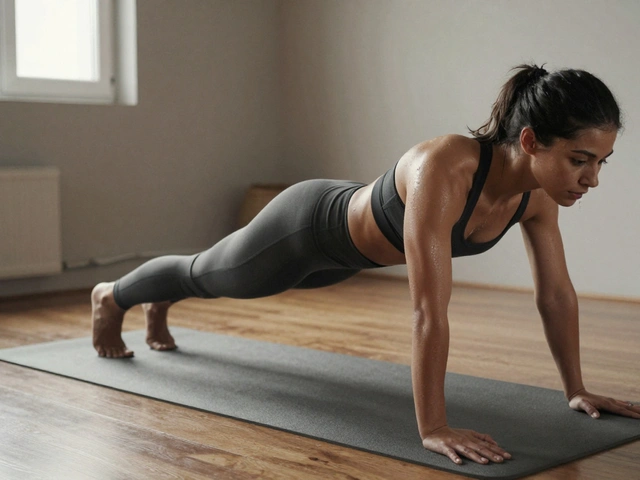If you’ve ever felt like your body stopped listening to your efforts, you’re not alone. Fitness models—those folks you see with abs so chiseled you could grate cheese on them—hit plateaus just like the rest of us. What sets them apart isn’t magic genetics but their playbook for smashing through barriers when gains stall, energy sags, and the mirror stops changing. Some can wake up one day and swear they look exactly the same as they did four months ago. Yet, a week later, they’re posting a new cover shoot. What’s the real secret sauce?
Why Plateaus Happen (And Why They Drive You Mad)
Even the fittest people hit the wall. In fact, plateaus are so common there’s actual science behind them. Your body likes to keep things efficient and predictable—so after a few months of eating and training the same way, it adapts. Calories burned during workouts drop because muscles are used to the movement. Metabolism slows to conserve energy. Hormones can get thrown off, especially with too-low calories. One 2023 analysis by the British Journal of Sports Medicine spelled it out: most people plateau after 6–9 weeks of sticking with the same program. Crazy, right?
Some blame their 'bad genetics', but watch any fitness model carefully and you’ll spot them changing things up—almost obsessively. If you’re watching someone on Instagram who always seems to look different or harder, chances are they’re constantly switching their game plan. One top UK fitness competitor told Men’s Health last year she never does the same workout routine for more than five weeks in a row, even if it’s working. Risky? Maybe. But she says, “I’d rather see what my body hates and shocks it than let it coast.”
There’s also the mental side. Plateaus don’t just flatten muscles—they can crush motivation. The sharper the model, the faster they recognize their headspace affects their progress. They don’t just track steps and macros; they write down wins, failures, moods, and sleep. Yes, really. A 2023 survey by UK-based FitPro found 87% of fitness professionals keep some kind of daily wellbeing log. Now that’s dedication.

Training Tweaks: How Fitness Models Break The Stalemate
Let’s talk about the nitty-gritty. How do fitness models go from dulled-out performance to eye-popping results? They don’t invent fancy new exercises every week. But their knack for change is almost strategic. Here are some of the tried-and-tested fitness model moves for when the scale won’t budge and you’re tired of seeing the same old in the mirror:
- Intensity cycling: Instead of grinding harder every session, they alternate between high-intensity days (sprints, HIIT, super-sets) and lower-intensity workouts (steady-state cardio, mobility work, stretching). This gives muscles time to recover and actually grow.
- Periodization training:
- They split their training year into cycles—sometimes 4-6 weeks apiece—dedicated to different goals: muscle building, leaning out, strength, and recovery. Imagine your progress as a staircase, not a ramp.
- Tempo and rep manipulation:
- Changing the speed of reps—for example, focusing on a slow four-count descent when lowering weights—can fry a muscle in ways your body doesn’t expect. One UK model swears by “negatives”—making the lowering phase extra slow—and credits it for his breaking stubborn biceps slabs after months stuck at the same arm size.
- Swapping exercises:
- Not just adding a new move, but overhauling whole patterns. Barbell squats become front squats or Bulgarian split squats. Pull-ups switch to inverted rows. The goal is to wake up new muscle fibres.
- Tracking everything:
- Training logs, sleep trackers, even readiness apps like Whoop or Oura are standard kit. After all, if you don’t measure it, you can’t improve it.
| Strategy | Frequency Used | Reported Success Rate |
|---|---|---|
| Intensity Cycling | 80% | 65% |
| Periodization | 75% | 72% |
| Rep/Tempo Changes | 65% | 58% |
| Sleep Optimisation | 60% | 61% |
| Diet Overhaul | 55% | 54% |
If you’re stuck, pick one strategy for three weeks. If nothing happens, move to the next. Most people jump programs too fast—stick with a change for long enough and track your numbers. That’s how you know if it’s working.
Remember, it’s not always about doing more. Shifting focus to recovery—foam rolling, cold plunges, massage, or just plain lazy days—makes a shocking difference. Fitness models aren’t superhuman; they just know when to pull back and let their bodies heal before hammering forward again. The result? More strength and definition, less burnout.

Nutrition, Mindset, and the Little Things That Matter More Than You Think
Training is only half the story. Every fitness model learns (sometimes painfully) that what you do in the kitchen, at the table, and even between your ears makes or breaks your results. Nutrition isn’t about starving yourself—starvation just makes your body hold on to fat for dear life. One London-based fitness model-turned-nutritionist explained her own turnaround: “When I stopped slashing calories and made protein and complex carbs a priority, my body suddenly changed. Abs got sharper, energy shot up. I was eating more, not less.”
If your progress is stuck, sort your food first. Here’s the blueprint top models swear by:
- Aim for at least 1.6 grams of protein per kilogram of bodyweight—hard muscle needs it to rebuild. Eggs, chicken, tofu, lentils, and Greek yogurt top their shopping lists.
- Carbs aren’t evil. Fitness models cycle their carbs: higher on intense training days, lower when resting. Oats, rice, potatoes and fruit get real love here.
- Fats come from nuts, seeds, olive oil, or salmon. They keep hormones humming and skin photo-ready.
- Supplements are basics: whey protein, magnesium (for cramp-free sleep), and vitamin D (thanks to planket-grey British winters).
- Drink more water than you think you need. Many plateaus are just sneaky dehydration. Fill a reusable bottle and keep it glued to your hand.
The real ace-in-the-hole is mindset. Fitness models journal, meditate, or see a therapist—not because they’re broken, but because stress can screw up gym progress almost as much as bad food. There’s data on this: a 2023 King’s College London study showed stress triggers cortisol spikes that make the body cling to belly fat, swamp recovery, shrink sleep... It’s the ugly truth few people talk about.
Sleep, too, is massively underrated. Seven to nine hours is non-negotiable. The late-night Netflix habit is a real results killer. Athletes and models set up blackout blinds, blue-light blockers, and 'phone-off-by-10pm' rules. The results? Better muscle repair, better mood, less hunger. Simple, brutal, effective.
The little habits often tip the scale—literally. Models track their steps with cheap fitness bands, get up every hour for a stretch, use post-it notes with reminders like “breathe” or “5 squats now”. They meal-prep religiously. If you can prep five lunches on Sunday, odds are you won’t panic-eat a takeaway at 3pm during a weak moment. That’s not discipline; it’s self-kindness disguised as routine.
Stuck in a rut? Here’s a dead-simple checklist any fitness model might use if they woke up feeling stale after weeks of hard work and minimal progress:
- Switch up one major lift or piece of cardio equipment immediately
- Book a deep-tissue massage or try cryotherapy for recovery
- Track every bite for three days—hidden calories add up fast
- Video a workout. Watch your form. Any cheating? Correct it.
- Take two honest rest days and spend them reading, walking, unwinding
- Set micro-goals: hit a new exercise PR, sleep 8 hours straight, try a blush-inducing new recipe
Maybe you’re not prepping for a fitness mag cover. But if you want to smash your plateau without burning out or losing your mind, steal the playbook from those who do it for a living. Every body is different, but every plateau is beatable. It just takes tiny, smart changes—and the guts to trust the process longer than feels comfortable. At the end of the day, the difference between standing still and making jaw-dropping progress is usually about the details—and being brave enough to shake things up when you’re stuck.









August 5, 2025 AT 13:36
BRIAN KING
Hey there! I really enjoyed the tips you shared about busting through fitness plateaus. It's super encouraging to hear that tweaking your nutrition and mindset can actually spark new progress.
One thing I've found helpful is tracking not just my workouts but also how my body feels day to day. It gives me clues on when to push harder or when to back off and recover.
I think sometimes people get stuck because they keep doing the same routine expecting different results — classic mistake! So mixing up exercises and really focusing on form helped me break through.
Thanks for sharing these insights, looking forward to trying some of your strategies.
August 7, 2025 AT 22:53
Shawn McGuire
I'm skeptical about some of these so-called 'proven strategies'. A plateau isn't always something nutrition or mindset can fix. Sometimes the body needs rest or a complete program overhaul instead of band-aid fixes.
Great to see people discussing these ideas, but I'd advise caution before blindly applying every tip you find online.
Not every 'fast result' is sustainable, and chasing them can do more harm than good in the long run.
August 10, 2025 AT 06:43
Manoj Kumar
Wat I find wild about this whole "break plateaus" topic is that we all overcomplicate simple stuff... like just eat more or change your weights. There's absolutely no secret sauce.
In fact, anyone claiming there's one definitive method is exaggerating, if not flat out misleading.
Seriously, just stop overthinking, lift something heavier or less depending on your body, incrementally mess around with macros, done.
But sure, keep looking for magic pills. 🙄
August 11, 2025 AT 11:36
ervin andriana taufik
LOL, I mean these fitness posts are kinda cute, but let's be honest, if you're really stuck, odds are you need more discipline AND patience.
I've seen folks jumping from one “strategy” to another, sacrificing consistency. Not good. Results come to those who sweat the small stuff every day, not those chasing quick hacks.
Mindset is huge, but you gotta show up. No shortcuts!
:)August 14, 2025 AT 21:33
Matt Basler
Hey everyone! Just dropping by to say, don't beat yourself up over plateaus. They happen to all of us.
Sometimes when progress stalls, taking a step back and reflecting on what your goals really are can help you reignite your drive.
Also, mixing in some active recovery and lighter days can boost your results in the long run.
Stay consistent, trust the process, and keep that positive energy flowing! 💪😊
August 17, 2025 AT 05:56
Erica Faith
This is such an insightful post! I appreciate how you emphasized the combination of training, nutrition, and mindset rather than focusing on just one aspect.
In my experience, a supportive community also plays a crucial role in overcoming plateaus by providing motivation and accountability.
Keep sharing these strategies; they’re truly valuable for anyone aiming for sustained fitness progress. 😊
August 19, 2025 AT 13:46
Alan Espinoza
Seriously tho, some of these so-called strategies are just reinventing the wheel with a fancy spin.
Anyone stuck at a plateau is often ignoring the basic principle: progressive overload paired with adequate recovery. No amount of mindset fluff changes biology.
Just my two cents, but let's not glamorize the struggle to sell content.
August 24, 2025 AT 03:46
Homer Simpson
Wow, lots of mixed feelings in here! To me, the key is balance.
Push yourself but listen to your body. Change your routine but keep core principles intact. The mental side is just as important as physical.
I also think it's wise to remember everyone progresses differently — patience is a form of strength.
Let's keep encouraging each other without oversimplifying or overcomplicating things.
August 29, 2025 AT 22:40
Ed Malaker
Hey all, just to add my two cents: sometimes the mental block is bigger than the physical one.
Psych yourself up, experiment with new goals, and maybe try some mindfulness techniques alongside your workouts.
Not saying it's a magic bullet, but an open-minded approach has helped me break plateaus far more than just changing weights.
September 4, 2025 AT 13:23
Cliff Levert
Hmmmm... Interesting topic! However, the whole idea of a 'plateau' is quite philosophical, isn't it? Do we truly plateau or is it just our perception of stagnation?
Moreover, the obsession with peak results might turn fitness into a Sisyphean task — forever rolling the boulder uphill with no final summit.
Perhaps it’s better to redefine progress not by metrics but by our evolving relationship with the process.
Food for thought.!?